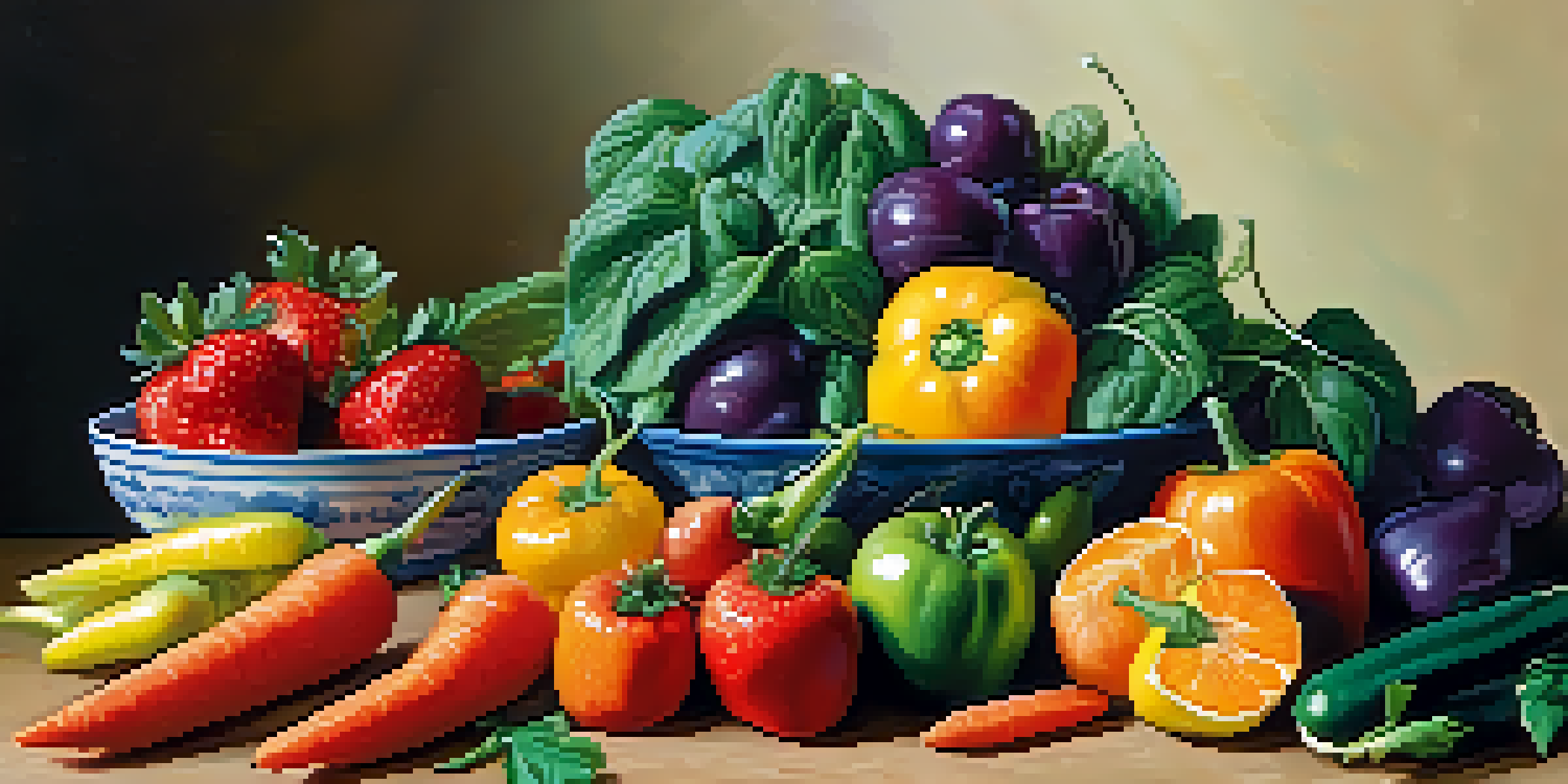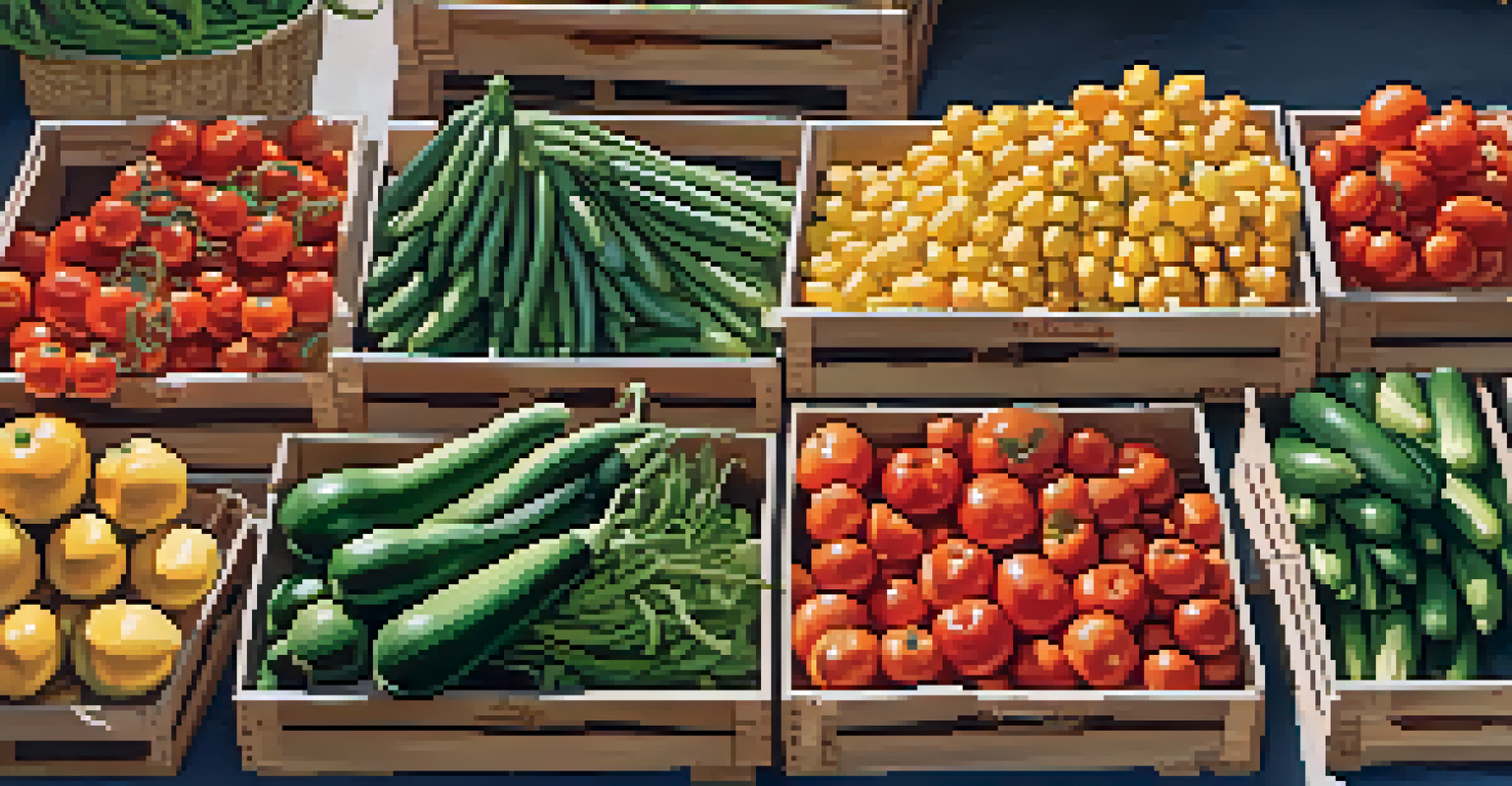Exploring Phytochemicals in Raw Fruits and Vegetables

What Are Phytochemicals and Why Do They Matter?
Phytochemicals are natural compounds found in plants that contribute to their color, flavor, and disease resistance. Beyond their roles in nature, these compounds play significant roles in human health. They are known for their antioxidant, anti-inflammatory, and immune-boosting properties, making them vital for a balanced diet.
Let food be thy medicine and medicine be thy food.
When we talk about phytochemicals, think of them as nature's way of protecting plants from pests and diseases. By consuming fruits and vegetables rich in these compounds, we can harness their protective benefits for our own bodies. It's like getting a boost of nature's best defenses every time you bite into a fresh apple or carrot.
Research suggests that a diet high in phytochemicals can lower the risk of chronic diseases such as heart disease and cancer. So, not only do these compounds add color and flavor to our plates, but they also contribute to our overall well-being.
Common Types of Phytochemicals Found in Fruits and Vegetables
Phytochemicals are categorized into several groups, including flavonoids, carotenoids, and polyphenols. Flavonoids, found in berries, apples, and onions, are known for their antioxidant properties. Carotenoids, which give carrots and sweet potatoes their vibrant orange hue, are linked to improved vision and lower cancer risk.

Another group, polyphenols, is prevalent in foods like cherries, grapes, and dark chocolate. These compounds have been researched for their anti-inflammatory effects and potential to enhance heart health. Eating a variety of colorful fruits and vegetables ensures you're getting a rich mix of these beneficial phytochemicals.
Phytochemicals Boost Health
These natural compounds in plants offer antioxidant, anti-inflammatory, and immune-boosting benefits essential for a balanced diet.
It's fascinating to note that the more vibrant the color of the fruit or vegetable, the more phytochemicals it usually contains. So, the next time you're at the grocery store, remember that the rainbow on your plate is not just appealing; it's also a treasure trove of health benefits.
The Role of Antioxidants in Phytochemicals
Antioxidants are a key component of many phytochemicals, acting as defenders against oxidative stress in the body. This stress, caused by free radicals, can lead to cellular damage and contribute to various diseases. By consuming foods rich in antioxidants, we can help neutralize these harmful molecules.
The greatest wealth is health.
For example, fruits like blueberries and strawberries are packed with antioxidants, making them a delicious way to support your health. Incorporating these fruits into your breakfast or snack can be a simple yet effective way to boost your antioxidant intake.
In essence, antioxidants work like superheroes for our cells, fighting off harmful invaders. Including a variety of antioxidant-rich fruits and vegetables in your diet can enhance your body's defenses and improve your overall health.
How Cooking Affects Phytochemical Levels
Cooking can have a mixed impact on phytochemical content in fruits and vegetables. While some phytochemicals are heat-sensitive and may diminish with cooking, others become more bioavailable when cooked. For instance, cooking tomatoes can increase the availability of lycopene, a powerful antioxidant.
However, methods like boiling can leach out important nutrients, so it's essential to choose cooking techniques wisely. Steaming, roasting, or sautéing can help preserve the phytochemical content while enhancing flavors, providing a tasty and nutritious meal.
Cooking Affects Nutrient Levels
While some phytochemicals diminish with heat, others, like lycopene in tomatoes, become more bioavailable, highlighting the importance of cooking methods.
Ultimately, the key is balance. Incorporating both raw and cooked fruits and vegetables into your diet can give you a broad range of phytochemicals and maximize your health benefits.
Seasonal Fruits and Vegetables Rich in Phytochemicals
Eating seasonally not only supports local farmers but also ensures that you’re getting fruits and vegetables at their peak nutritional value. Seasonal produce is often fresher, tastier, and packed with higher levels of phytochemicals. For example, summer brings an abundance of berries, while fall offers pumpkins and squash.
By focusing on seasonal varieties, you can enjoy a diverse array of phytochemicals throughout the year. This not only keeps your meals exciting but also helps you reap the maximum health benefits from the freshest produce available.
As the seasons change, so can your diet. Embracing seasonal fruits and vegetables can be a fun way to explore new flavors and ensure you’re getting a rich mix of phytochemicals to support your health.
Tips for Maximizing Phytochemical Intake
To maximize your phytochemical intake, aim for a colorful plate. The more colors you include, the more diverse the phytochemicals you’ll consume. A vibrant mix of fruits and vegetables not only makes your meal visually appealing but also ensures a broad spectrum of nutrients.
Incorporating whole foods into your diet is another effective strategy. Whole fruits and vegetables retain their phytochemical content better than processed foods. Snacking on raw veggies or adding fresh fruit to your breakfast can be a simple way to boost your intake.
Seasonal Produce is Best
Eating fruits and vegetables in season not only supports local agriculture but also ensures maximum phytochemical content and freshness.
Lastly, consider growing your own fruits and vegetables if you have the space. Homegrown produce often retains higher levels of phytochemicals, allowing you to enjoy the freshest and most nutritious options right from your garden.
Conclusion: Embracing Phytochemicals for Better Health
In conclusion, phytochemicals play an essential role in promoting health and preventing disease. By embracing a diet rich in raw fruits and vegetables, you can tap into the powerful benefits these compounds offer. It’s a simple yet effective way to enhance your overall well-being.
Remember, variety is key. The more diverse your diet, the more phytochemicals you’ll enjoy. So, don’t hesitate to explore different fruits and vegetables, and even experiment with new recipes that highlight their flavors.

As you make these changes, you’ll not only nourish your body but also enjoy the vibrant tastes and colors of nature's bounty. Let the exploration of phytochemicals be an exciting journey toward better health.